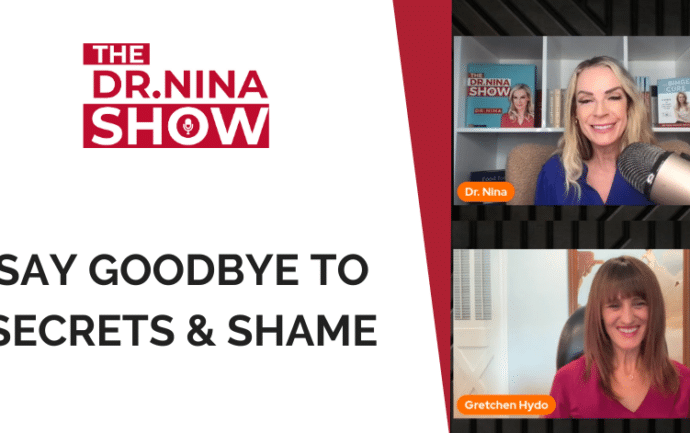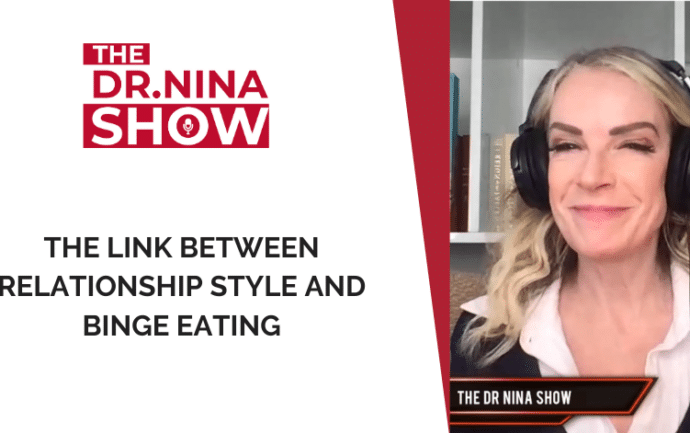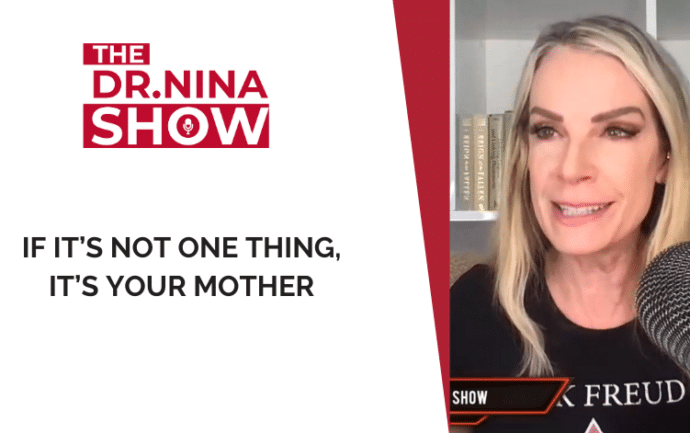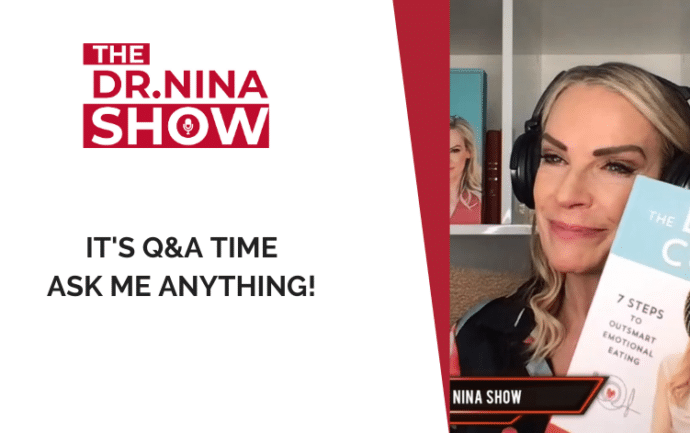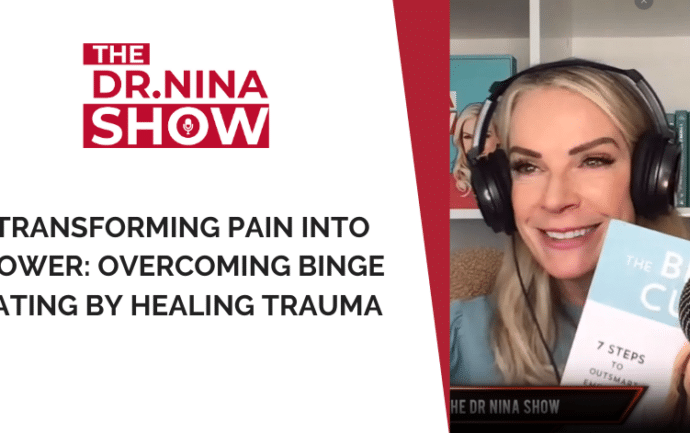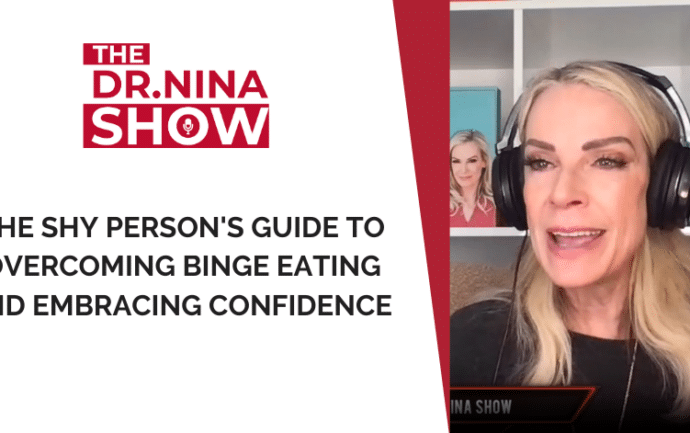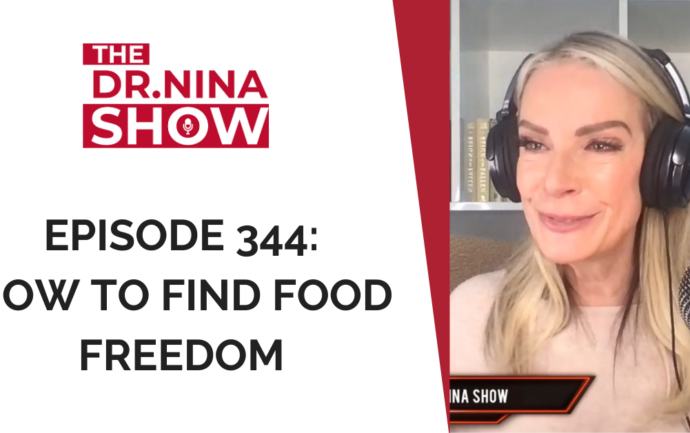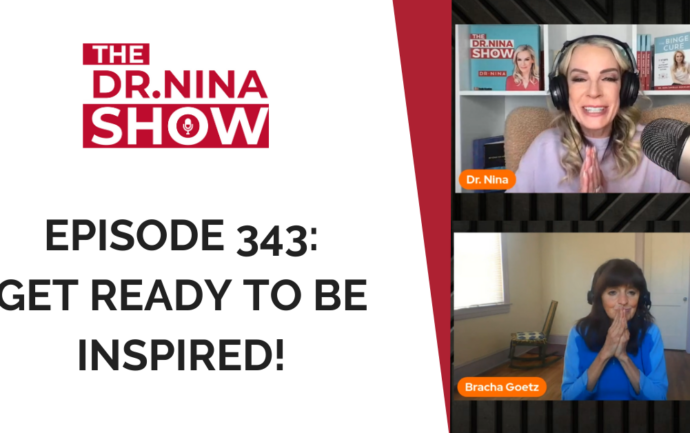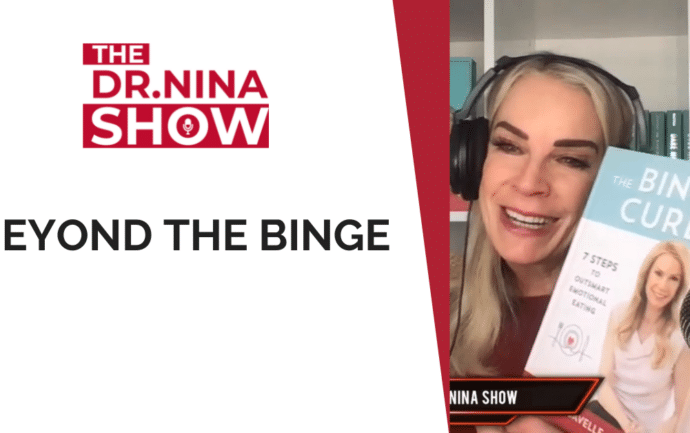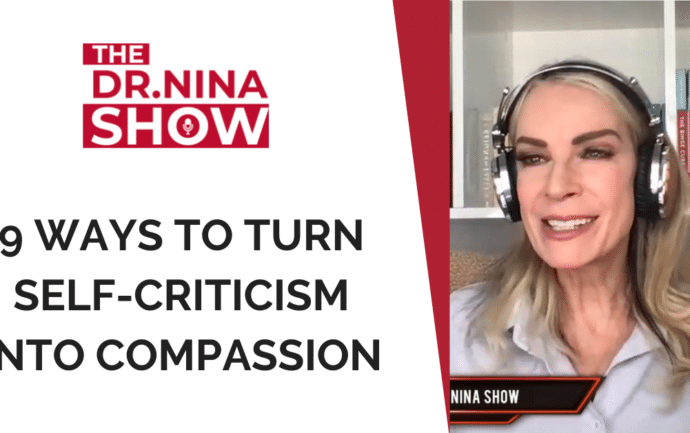Dr. Nina Savelle-Rocklin
What to Do When You Don’t Feel Good Enough [Podcast]
Summary
I discuss what to do when you don't feel good enough. The first step is to stop comparing yourself to others. I give strategies on how to stop comparing yourself and how to feel better in your body and your life.
Josh calls to discuss how to handle despair and we explore gender differences when it comes to expressing emotion. Men and women are socialized to experience certain emotions over others.
I also explain how to heal from emotional wounds, how to face the fear of losing good feelings, and how to respond to yourself when you're upset. Don't miss this helpful show!
Transcript
You're listening to the Dr. Nina Show with Dr. Nina Savelle-Rocklin only on La Talk Radio.
Dr. Nina:
Welcome to the Dr. Nina Show here on La Talk Radio. I am your host, Dr. Nina Savelle-Rocklin, and I am here to help you break free from body shame, binging, and diets that don't work. I want you to wake up and think about your day, not your diet. How amazing would that be?
By the way, if you love the show, please take a moment to rate or review it on Apple podcasts, I would appreciate your support. In addition, if you would like to join me today, the call-in number is 323-203-0815. I would love to know what is weighing on you. What is eating at you because the real problem with binge eating, stress eating any kind of emotional eating, the real problem is not food. The real problem is what is eating at you.
Introduction
Dr. Nina:
So eating is a solution to the problem. It is not the problem. We want to talk about the problem and find a solution to that.
Okay, so something that I hear a lot is “I'm just not good enough.” People say “Oh, I just I'm not good enough” or “I got this great job, but I somehow fooled them,” right imposter syndrome. I'm not good enough to do that or who do I think I am? I'm just not good enough. And they can't say why you can't say why you're not good enough.
Like logically, you know, you're good enough.
Dr. Nina:
Oh, I have to interrupt myself what Josh is saying. Joshua saying I didn't even know I had an eating disorder. That's right. A lot of people don't think that they have an eating disorder. They think they're food addicts. They think they have no willpower. And yes, examined life, you can ask questions here instead of calling in. Absolutely. I neglected to say that if you are on Instagram. Just drop a What did I just do? What did I just do? I don't know what I'm doing. Okay. I'm on Instagram. What the heck was I saying? Not good enough, right? Not good enough.
This is an idea. It is a construct. It is pervasive. So many people don't feel like they're good enough. Intellectually, they know they're good enough, you know, you're good enough. And then emotionally, you may feel as if you are not good enough.
So there's that conflict between what you know and what you feel what your mind says one thing, your feelings say another thing, and that is why I often say it is not Psych is not logical, it is psychological, it is not logical.
You know what, you know? So what? Who cares?
What you know, makes very little difference in how you feel and what you do.
Steps to feel good enough
Dr. Nina:
So how do you get to a point where you can feel good enough? So here are some steps to feeling good enough. Number one, stop comparing yourself to others. Big one, which we've been talking about for the last couple of weeks. Number two, recall past achievements. Three, focus on the process rather than the results for talk to someone you love, or who loves you, and lastly, do a random act of kindness. And I'll get to those more later.
Comparison
Dr. Nina:
But first, I want to keep talking about comparison, I started talking about comparison. Last week, I told you about Zoe, who want wanted to join one of my support groups, but she came up with all these excuses. And ultimately, it came down to her feeling of comparing herself to the people that she thought were going to be in the group and she thought she would be the biggest one there. And this was so horrifying to her that she just wouldn't even go to the group. To stop comparing yourself to others, which is part of feeling good enough, you got to do two things. You got to look at your relationship with yourself and your relationship with others. And you got to identify your relationship with yourself. Where do the critical thoughts that you have about you, where do they come from? Then you have to look at how your experiences with other people, affect your expectations that you're going to be viewed in a certain way. Because if we are judged by other people, we expect to be judged by yet other people. The past informs the present, that what happened in the past affects what you think you're going to experience in the present or the future.
So first, let's look at your relationship with yourself. And in Zoe's case, her fear was about being the biggest person in the room. And by the way, let's say you are the biggest person in the room, whether it's an office, a gym, a restaurant, a party, or whatever, then, what do you imagine people are thinking? Is it just a fact? Like, so and so has red hair, so and so has blonde hair, so and so is then so and so is, you know, bigger? Is it something shaming? And I asked, so what does she imagine people would think? And she said, well, they'd think I have no willpower. They'd think I was disgusting and gross. And they wouldn't want to have anything to do with me just by looking at me. Ouch right? I get a little sad just thinking about it, you know, that you would feel so certain that people would judge you just based on your parents. You know what she said, Gosh, I am given girl getting all teary. It's so heartbreaking. Let me tell you, what Zoe said about herself. She thought all of those things; she thought that other people would have the same harsh thoughts about her that she had about herself. So unbeknownst to her, she projected her thoughts about herself out at them, and then back at her.
Self-judgment
Dr. Nina:
Now, most of us are not psychic. I would say none of us are psychic. I'm sorry for the psychics out there. But I have just one question. Why didn't you tell us about Coronavirus? If you're psychic? Why didn't you tell us about Coronavirus during the pandemic? Okay, I digress. We're not psychic. We don't know what other people are thinking. But if you're sure that people are thinking the worst about you, you might want to investigate how you think the worst about yourself.
Identifying your self-judgment is the key to building positive self-esteem because you got to identify the judgment, you got to challenge the judgment, and create a more reasonable and realistic view of yourself. If you see yourself as disgusting and unlikable, you're going to imagine other people will see you as disgusting and unlikeable. If you are critical of yourself and judgmental of yourself, not only will you expect that other people will judge you and criticize you. But if you meet someone critical and judgmental, you are going to tolerate that because you'll be like, oh, you know me, well, this voice is familiar. And you're going to tolerate an interaction and behavior and treatment that you ought not to tolerate. Because no one should judge you and be critical of you and be mean to you. But if you see yourself as good, likable, approachable, fun, and just like a good person to be around a good friend, then you're going to imagine that other people will feel the same. If you like yourself, it's easier for you to imagine other people are going to like you, and it's going to matter less about what other people might think that might be, you know, the judges.
Covert and Overt
Dr. Nina:
I had a friend from Texas and one of the things he used to say all the time is Go big or go home. I guess that's a Texas thing, do it big, or don't do it at all. So go big, be an emotional heavyweight, be the person with the biggest self-confidence and the largest self-sense of self and I don't mean being a little bit you know, playful with this. But I mean, like, cultivate a bigger sense of self. Cultivate a sense of goodness about yourself, and well here's some food for thought to help you with that. Okay, this is what I want you to think about. Where did you get the idea that you're not good enough? Did someone tell you that either overtly or covertly? Oh my god, you can't believe you messed up again, you're never gonna succeed. You always failed, you always do things wrong, and you always mess things up. Right. It's pretty overt. Covert is, um, you know, I just don't know why you can't like, do better. I just don't know why did these things happen to you? You know, things like that are messages that we interpret as I'm just not good enough? What's wrong with me? Also, what do you think needs to change for you to know or believe that you are good enough?
And by the way, what's good enough? What is the standard of good enough? A lot of people say, Well, I want to be I want to feel good enough. And I'll say, Well, how will you know when you feel good enough? I don't know. You got to have a standard of what enoughness is, to reach it. Josh is saying when a parent shows us how to be too strict with ourselves, we listen. Yes, we internalize the way we are treated. And so that parental voice becomes our voice on the exam, the examined life is saying, my parents, and I'm in my 40s, and still can't get over it at this point, not being able to get over it is what makes me dislike myself. Oh, the exam itself, let me tell you, time does not heal all time on its own, doesn't heal the wounds of the past, in our unconscious, there is no time, we can feel things as strongly today in our 40s, 50s, 60s or 80s. Or whenever, from what happened in the past until we heal, we have open wounds within. So if you are getting upset at yourself, disliking yourself, simply because you feel something very unfair to yourself. The people say, Well, you're a psychoanalyst, why is everything about the past? You know what it's not about the past, it's about how the past is haunting the present. If your parents were cruel, critical, neglect, or hurt you in some way that was either, you know, maybe a little benign and maybe really egregious, it doesn't matter. If you haven't healed that and you have internalized it, then the past is not in the past. It's in your present, and, you are getting mad at yourself because you're not over it.
Question: How do you get over your past and heal?
Dr. Nina:
By the way, how do you get over it? Did you get over it? Is it something that you have to, you know, jump over? Is it some life hurdle that I don't know about that? You just, you know, go over something, and then you're done. No, you can't drop it. You can't do positive things in a way. Time doesn't heal it. You can't stuff down, you can't starve it away. The only thing you could do to heal is to go through a process of healing, of recognizing how it affected you go through, you know, anger, bargaining depression, until you find acceptance. Yeah, that's how you heal. So, examine life, and please do not turn against yourself because you feel a certain way. You're in your 40s and you are still upset about your parents. If you don't heal that wound as I said, it's going to stay open and raw. But when you heal, kind of like when we cut ourselves, it's an open raw bleeding wound. But when it heals it gets a scab and then the scar is where it used to hurt, but it no longer does. Same with emotional wounds. We don't heal them they're just hurting all the time.
Healing
Dr. Nina:
Yes, the examined life, I'd say if you've been through therapy, but you need to go through it again. You might want to go to a different kind of therapist who can not just talk about the present and past, but talk about how the past and the present collide and how your present difficulties have their roots in the past so that you can heal. I think that is a great idea. Keep me posted and let me know how it goes. Okay, so what again, what do you think needs to change for you to feel good enough, how do you heal the past? I don't even know I'm not gonna butcher your name.
So, the person on Instagram, how can you heal? Well, first you have to recognize it, you have to recognize what had happened. You have to allow yourself to have feelings about it. And say, well, this is what happened to me, not from a blame perspective, not to say, Oh, this happened poor me, that's why I struggled. It's their fault. That is not what I'm talking about. That is blame, that gets nobody anywhere, and that does not help at all. But explaining to say, this is how I was treated. This is what happened to me. This is how it affected me, my sense of self, my feeling about myself, my feeling about other people, and my feeling about the world. I want to recognize that and work through it. I'll get to how you work through it in a moment in the service of healing it and changing it. So first is, hey, I want to look at this not from a victim perspective, but from a place of interest, and be curious about how you came to feel this certain way. Then healing involves going through a mourning process, not just for what happened before what didn't happen. If you had a Dickensian childhood, like out of a Dickens novel, terrible things happen. Awful things happen constantly, then, people identify and interpret it as this happened, because there's something wrong with me.
Kids do not have the wherewithal to say, What's wrong with my parents that they're treating me this way? What's the deal? Or, Oh, they're going through a lot and they don't know how to handle stuff. Parents say to do what they do. Kids say they're doing this to me because there must be something wrong with me. I'm not good enough. I'm too much. I'm bad. So the first step is to go well, how were you treated? And how did you interpret it, and then go through the mourning process of what it was like to go through the difficult times you went through while recognizing how it affected you? That means the stages of grief with death and it applies to all kinds of grieving, I believe our denial, didn't affect me. Now I'm stronger for it. It had no bearing on me other than I'm a better stronger person in the world. That's usually total denial, partially true, but denying the pain and anger. Oh my god, I can't believe this happened to me. This is wrong. I was an innocent child or you know, however old you were. This happened to me it is wrong. It was unfair. It was painful. I'm outraged. I'm angry. I'm so frustrated and upset that this happened to me and processing it not just thinking about it a lot of people think that they're expressing their feelings when they're just identifying their feelings. So identifying your anger is oh, I realized I was very angry about that. Yep, very outraged very angry. That's identifying it, right? Feeling it is oh my god, I'm so upset. Oh, right. The feeling is different from thinking. Then the stage is bargaining. Well, maybe if I do this, I'll feel differently or maybe if I do that, they'll treat me differently, or maybe if I just weren't right bargaining the if then when then eventually got to give that up. And then you get sad you get depressed. Oh, this happened to me. This is sad.
This is how it's affected me all this, how sad. This is painful. And then that leads to acceptance. That's when you have the scar. Yes, it happened. But it doesn't affect me anymore. It doesn't affect me the way it has. And then you also do the same process for what didn't happen. The family you didn't get, the relationships you didn't get, the love, the acceptance, and the sense of oneness. Being that you didn't get to have to acknowledge, recognize and mourn what you didn't get to have. So I hope that answers your question.
Focusing on yourself
Dr. Nina:
Josh is saying when a parent treats us badly, we feel despair. Yes, we feel despair. And we also often feel as if we're bad. Oh, we're being treated badly, we must be bad, or we must be not good enough. Back to the not good enough. Now, think of someone you compare yourself to. What do you imagine would happen if you had her or his looks? Wait, finances life? What do you imagine would change if you were that person? And then ask yourself, what? Oh, I'm so glad that I'm answering. I'm not going to eight, EO lightly Layli. Oh, I can't pronounce names. I am so sorry. But I'm really glad that helped. Then, think about something you feel good about yourself. Think about what you feel good about physically. And before you say, Oh, I hate everything physical about me, look in the mirror, find something about yourself that you like you will find something about yourself that you like and focus on it. Focus on what you like about yourself. Because if we only look at what we don't like, we never see what we do. Like I always start my coaching programs, my group coaching programs, including the one I do with Kelly Gunter, who is the author of you have such a pretty face. Great book with wins, we talked about what are the wins you had during the week. So that we can start focusing on what are we doing, right? And at first, no one can do it. I don't know, I didn't do anything, right, nothing could happen. If you think about it, you start to recognize it. No, I did this differently, I took this step, and I liked that I did that. The more you practice focusing on what you like about yourself, what you're what you look like you're so physically, emotionally, and mentally, and what you feel good about relationally. When you start focusing on that you will discover things you like, and feel better about yourself. Remember, the number on the scale does not define you it is just a measure of your weight. It does not measure you as a person. That's why you're not a better person. If you're thinner, you're not a worse person even if you're heavier. Keep in mind that the size of your kindness, your generosity, your intelligence, your compassion, all of those things are a far better measure of you as a person. Just one thing, Josh, I just want to finish up and then I will get to you. I see you're waiting, hold on. If other people do not get past the number on the scale, then you've got their number, so to speak, and you can delete it. So pleased with myself. Okay. Hi, Josh.
Josh:
Hi, Dr. Nina. Um, hopefully, you had a really good week. I appreciate just being able to talk to you. I just wanted to report that I'm doing really well I've stayed true to my feelings. As a result of that, I haven't needed as much food as I was eating, which is great.
Dr. Nina:
That's wonderful! It sounds like you're much more attuned to yourself. Because when we're thinking about food, or we're eating food, we're not with ourselves. And it sounds like you're much more able to be with yourself. What are you noticing?
Emotions and feelings
Josh:
Well, I'm noticing when people don't behave the way I would expect them to, that's the worst thing. What happens from that is they start to eat me. And then if I'm not conscious of it, which is very painful to be conscious of because we live in you know, a society where we all have to live together and we share certain things and we have to cooperate, the pain of having people not behave the way you expect them to is what is eating at me.
Dr. Nina:
Pain, disappointment, and what comes to mind about that specifically like you know sometimes we have experiences in the present, but it is just a re-experiencing of something from the past.
Josh:
Yes. So it had to do with my parents growing up. They may have not behaved the way I wanted them to all the time and it's the same feeling.
Dr. Nina:
Yeah. When you say they might have not behaved the way you wanted to, can you be more specific?
Josh:
Yeah, I think my father was, you know, a little probably, not so accommodating. I sort of took sides with my mother. And in that case, it was difficult because my father would not, he's a Republican. He's sort of, you know, he voted for Trump, and I don't want to make it political, but it certainly wasn't too good to be brought up in that kind of environment because the child should be allowed to feel even a male child should be allowed to feel emotion.
Dr. Nina:
Interesting, even a male child. Yes, all people, whatever their gender, male, female, or non-binary, have emotions, and we need to be able to recognize them and then learn to soothe them, we'll learn to express them and sue them. If you're not allowed to have your feelings, or you're only allowed to have certain feelings, then you don't know how to express them and feel them and you don't know how to sue them. That's what food does and that's why food is the solution. Not the problem,
Josh:
I think, you know, I always compare myself to you. Not being able to feel emotions means I needed to have food, to fill that void. I think in what you've shared from your experience, you weren't allowed to have food felt. But it's not any different for me, is by not allowing to be able to have emotions, did eventually lead to a food issue.
Dr. Nina:
Then the emotions that you're not allowed to have about other people can come back at you. So let's say you're mad at your dad, the Republican Trumper you're mad at him, but you're not allowed to be mad at him or you can't have a discussion with him or you can't express yourself. Then you go eat whatever, and then you're mad at yourself for eating. Therefore, you've taken the feelings that belong to someone else and attached them yourself.
Josh:
Yeah, I mean, they have to go somewhere. Because children don't have appropriate aspect regulation.
Dr. Nina:
Um, that's, look, children have feelings. Children have feelings. When they have to learn then everything feels intense when you're a kid, right? We have to learn to gauge and regulate our feelings. But if we don't learn to gauge and regulate our feelings, and by that, it's like on a scale of one to ten. You know, like, let's take anger, rage is ten annoyances a two or three. But if you're never allowed to feel, any form of anger, then any feeling than annoyance can feel like ten. It's too much and we're walking around always feeling like any feeling is too much and we are afraid to feel them at all. Except for stuffing the feelings, eating the feelings, and then getting mad at ourselves.
Josh:
Yeah, I mean, when we can't feel feelings or when we can't eat food. We're going to feel some despair. Because even though you may not be able to feel feelings, you might be still alive. If you're not able to eat food, you can die.
Dr. Nina:
Well, yes, but just what we're saying is if you don't learn to, compassionately be with your internal world, accept, love, and comfort, you're going to turn to food to express something inside you that might start some people to starve themselves so that the emptiness and loneliness they feel is felt in their bodies. Some people stuff a lot of food in to symbolically fill a void. You want to see for yourself, look at what's going on, in terms of your thoughts and your emotions, and how can you respond to yourself the best way that you can?
Josh:
Yeah, you know, it's something that you and I think you said about Christopher Balagtas. It sits in my mind. And I think we always talk about one thing, anger, or this or that, but in reality, there are so many things, so many competing feelings, and ideas, and most of it is completely at odds with each other. So, to start with, I think we have to get over this fear of the complexity of our minds and try to do what we can.
Dr. Nina:
Okay, and Josh, I challenge you to talk about yourself. Um,
Josh:
Yeah. In my case, it would be feeling despair. Because when, let's say a child is feeling sad, just normal sadness. What child hasn't felt that if that child meaning me, wasn't allowed to feel sadness, that sadness turns into hopelessness? Very quickly.
Dr. Nina:
Yes, yes. It goes from sadness to despair. If you are and Reagan, I see your question in the thread. I'm going to get to it. As soon as Josh and I are done with this important conversation, Josh because they're in. If you don't feel a little sad, you're going to go to despair. If you feel sad and no one is there to comfort you, hug you, and say, Oh, yeah, you're sad. Of course, you're sad. How could you not be sad, right? This is my very technique. How could you not be sad? Anyone in this situation would feel sad, here's a hug. It's okay. You're going to feel better, you're going to get through this. But then feeling sad is not so scary. But when you feel sad, and you're shamed for it, when you're dismissed, when you're ignored, when you've neglected, then feeling sad is devastating and does turn into despair. That's why showing up for yourself and being available to yourself to validate, acknowledge and reassure yourself makes you feel better than not responding to yourself. When you respond to yourself. You don't need to react, oh, this is a bad feeling that's coming on. What's in the pantry?
Josh:
Yeah, or anger.
Dr. Nina:
Anger? Or anything, right? You'll do the same thing. It's the same formula if you will. I'm mad, of course, I'm furious. How could I not be? This is a situation it's enraging. Oh, so pissed. But what happened?
Josh:
What happens when you get angry is you forget the original thing that was causing you just feel slightly sad.
Dr. Nina:
Yes, well, what you're talking about is a phenomenon that happens. It's a gendered phenomenon often, but not always. Whereas guys, who are socialized do not feel sadness, they're socialized to feel anger, and anger is acceptable. Not and so a lot of times guys, instead of feeling sad, because that's, you know, guys don't cry. They go right to anger. Girls also are socialized not to be angry and sometimes when they're angry, they go right to sadness.
Josh:
Interesting, that's interesting.
Dr. Nina:
How do you know what's happening if sometimes you cry, and sometimes you express anger, then you can be pretty clear that you're responding to the appropriate feeling to the situation. If you never cry and you're always mad, or you're never mad, and you're always sad, then that's something to look at.
Josh:
Yeah, and I think what's so interesting is how we respond to despair. What's our initial response? Do we just dig our heels in more? Do we start to, you know, feel that we have to be better than the other person? Do we start to unconsciously compete? You know, these are the kinds of things that we should be aware of, because every one of us is going to feel despair, at some time in our life.
Dr. Nina:
Well, Josh, I noticed a lot of times you go to us, and not me. So I'm going to say to you, how you respond to despair is the same way you respond to any other experience, you validate, and you give expression to it. I know you have my book, The binge care, go to pages 45, 46, and 47. There are prompts for sadness, anger, and loneliness for different emotions, finish the sentence and finished the prompts. So first, express it. Secondly, um, respond to yourself, and that's the very validate it, acknowledge it, and reassure yourself.
Josh:
Yeah, I think that's great. You know, I have been thinking about sort of despair, and I think Kierkegaard wrote about despair. It is something that should be cherished, it's something that we should be interested in our despair, if we can, in the despair of others. I mean, I think that's what makes us compassionate, sane people.
Express your feelings
Dr. Nina:
Well, that's more of a philosophical discussion. But if we can feel despair, if we can also know we’re doing it, the general is generalizing if we can feel joy and despair. That's the human condition. If we always feel despair, that is emotional dysregulation as you put it, that being in a bad place, and then we feel stuck in that food is the thing that gets us out of it, then we're in a toxic relationship with ourselves. I encourage you to practice expressing your feelings then validate, acknowledge, and reassure to respond to them. And let's see, uh, well, let's see what comes up.
Josh:
That sounds good. Thank you very much. Dr. Nina.
Dr. Nina:
You're welcome, Josh. Thank you, as always, for elevating the conversation.
Josh:
My pleasure. Talk to you next time.
Question: How to feel good and say you are good?
Dr. Nina:
Okay. Bye. So Regan is writing on Instagram, I'm in the binge-free babes. When we started doing the wins, I didn't get it. Then I got it. I struggled to say the winds allowed. Now I get it. I'm on board. But I am struggling with the good, saying the good out loud and feeling good. How do I keep going?
Well, hi, Reagan. I'm glad you're here. That is a great question. Because so often, we can be afraid of the good we want desperately. And yet we have some negative associations. Oh, I'm not I'm not good enough to deserve this good. I don't deserve this good. The universe is going to realize it made a mistake and then they're going to take it away from me. Or who am I to think well of myself, right? This idea that having positive self-esteem somehow makes you an arrogant person. Uh, those are things that can also be a play. So Reagan, and anyone who could relate to her question you know. How do you stay with the good? You listen to the part of the voice within that tells you why you shouldn't be feeling it. So is it fear? You know, like, break down that uncomfortable feeling and turn it more into a dialogue? Is there a part of your mind saying you don't deserve this? Is there you, by the way, a second-person voice at work here? Is there a voice going you don't deserve to feel good? What do you think you are feeling good about? That's not for you. Bad things happen to you. You're tempting the universe. Right. So, Reagan, I don't know, if you're still there, if you are, feel free to post. But with any change, right with any change practice makes progress. It is it's hard to change even when the change is positive, we go for the familiar, but we have to look at well, you know, what makes it feel safe, what makes a negative, painful situation, feel safe, because it's familiar, but also because we got messages that some part of us. Remember, it's not logical, it's psychological. So if some part of you believes, hey, I deserve good things logically, I'm a good person. I know Reagan is a good person, I'm a good person. I'm creative and talented, and I believe in good, I believe that I deserve to feel good, right? Reagan, feel free to join in. But another part of your mind says, not so fast. You don't desert-like, don't step on that rugged happiness, because someone is going to pull it out from underneath you. You don't deserve that. You're supposed to suffer. Well, if you have these ideas, whether you're conscious of them or, or they're operating out of your awareness. Unconscious means basically, something is out of your awareness. It is not out of operation, it is out of your awareness. It has so much power over how you think and what you do and you're not even aware of it. That's what makes it like the unconscious mind is so interesting, and so vexing because it has so much power. We're gonna think she listens to the familiar voice way too much. Whose voice is that? So if you have trouble holding the good, and the familiar voice is saying, This is not for you. Well, either that's your voice based on an interpretation of what happened to you or it's someone else's voice saying, Oh, that's not for you. You know, I've shared that, um, you know, people have been told, Oh, you know, you've climbed so far, it's gonna be quite a fall when you know as if they can't. I mean, family members have told them this one person, her mother said, Oh, well, I knew you were bound for a crash because you would climb so high, of course, you're gonna fall.
If something is wrong in the present it is because of the past
Dr. Nina:
It's not so okay. So the voice is her dad's right. So your dad's voice is saying, no, no, no, that's not for you. Yeah, I mean, that's very painful. Like it or not, when we're kids, our parents are the first gods, right? If everyone loves you, but your parents are, like, nasty to you, or they finally find fault with you, they criticize you, who are you going to believe all the people who love you or your parents are supposed to know you the best?
Our parents are the first gods. And if our parents for whatever reason are not able to be there for us, be loving, be nurturing support us, then, you know, we think we don't deserve support, we think we're not good enough. Again, back to that, we grow up thinking we're not good enough. Back to the, you know, the topic I started with, we come to believe we're not good enough based on an interpretation we make about ourselves, which is by how other people treat us. Kids do not have the wherewithal to say, you know, I'm for example, my, my, my, my mom isn't it's not me talking. This is an imaginary person, right? Going, my mom's in and out. My mom and dad, they're alcoholics and they can't deal with their stuff. They're diving into a bottle every night that's why they're neglecting me and this is hard. I feel so powerless. Kids do not say that. Do kids think what's wrong with me that they'd rather drink until they get into oblivion than spend time with me? What's wrong with me? When you're a child, this gives you some hope. If you can figure out what's wrong with you, and make yourself better then the fantasy is the illusion Oh, then they're going to be nice to me, then they'll stop drinking themselves into oblivion, then they'll hang out with me if I can just figure out what's wrong with me and make myself right that I'm going to get different treatment. Except this is an illusion. There's never anything wrong with you, there's something wrong with the way you're being treated. If you don't see that, and you think, well, something's wrong with me, then you become an adult who just has this sense of, I'm not quite good enough, or I'm too much, and that those often go together. I'm not good enough, and I'm too much. Challenging these ideas, they go back to childhood, this is why I say the past is not in the past, the past is in our present. If you don't feel good enough, in your present, I guarantee you, it's because something happened in the past that made you decide and come to believe that you're not good enough. And we got to have one foot in the present, and one foot in the past. I like to pretend to get in my DeLorean time machine because I love Back to the Future so much. Go into the DeLorean Time Machine, go back in time, and talk to your younger self from a place of understanding. Now, what happened, it wasn't that you weren't good enough, it was that your parents didn't know how to cope. That's why they drank or they didn't know how to relate to other people. That's why they never played with you or engaged with you or they don't know how to be with themselves. How could they be with you in a meaningful way? When you heal the wounds of the past, the present is transformed. Where does food come into it? If you never learned to comfort yourself, if you never learned to reassure yourself, if you never learned to encourage yourself, you just feel terrible all the time. Food makes you feel better.
Food expresses emotions and feelings
Dr. Nina:
Food also helps you express your pain, right if you eat so much that you're in pain and people when I was full on in all my eating disorders, I remember doing that I remember just being in complete pain. And yet I couldn't stop. Looking back, I now realize I was completely translating my emotional pain into physical pain. Once I dealt with the emotional pain, things with food completely normalized. I went from being the poster child of eating disorders, to not having any eating disorder thoughts at all. That's why I'm telling you based on 20 years of experience, you know as a psychoanalyst, and a coach exclusively treating eating disorders, having eating disorders from when I was, you know, five years old to college? I know there is hope. I don't believe in recovery. Recovery is you're in it and recovery. Who wants to be in recovery? No. I am here to tell you that when you deal with what's eating at you, and you heal, you are liberated.
Liberation
Dr. Nina:
Liberation means you won the diet like you won the war, and you're done. You're victorious. You don't have to fight anymore. That liberation means you don't think about it at all. You can go have breakfast, lunch and dinner and snacks. Just think about what you want and not and not have it be an obsession, a preoccupation, you can lose weight without dieting, and get to a healthy normal weight, that's liberation. I may be passionate about this idea. As you can probably tell, so excited about changing the dialogue in our world, in our society, which we can do.
Dr. Nina:
I want to thank everyone who participated today. I want to thank Josh and Regan and everyone else. Everyone else examined life and oh gosh, I don't know how to say. I'm going to call you Leila because I can say the last part of your Instagram name but thank you all for joining in the conversation today. Because when you bring up something I know that there are thousands of other people out there who can relate to what you're saying. We are all much more alike than we realize. We live in a society that tells us not to feel things. Not to want too much. So what do we do when we feel things and we want things? What do we do when we don't feel good enough? Al, okay. I'll call you an Oh, thank you. Lately, I also can't see the name very well. I need to have my glasses, which I don't have. But thank you, everyone, for joining me here on the Dr. Nina Show.
By helping yourself. You also help other people. We're changing the conversation. We're changing the world. I am every Wednesday at 11 am Pacific here on La Talk Radio and Instagram. You can also listen later on Apple podcasts. Just look for the Dr. Nina Show on La Talk Radio, on Apple Podcasts, or wherever you get podcasts. And again, if you like the show, please give a rating or a review because the more ratings and reviews we get, the more it shows up in searches and the more people we can reach and help. So have a wonderful week I have a great guest next week. Dr. Maggie landers you're going to love her. I will see you then. See you next week. Bye for now.
You're listening to the Dr. Nina Show with Dr. Nina Savelle-Rocklin Only on La Talk Radio.
The Author
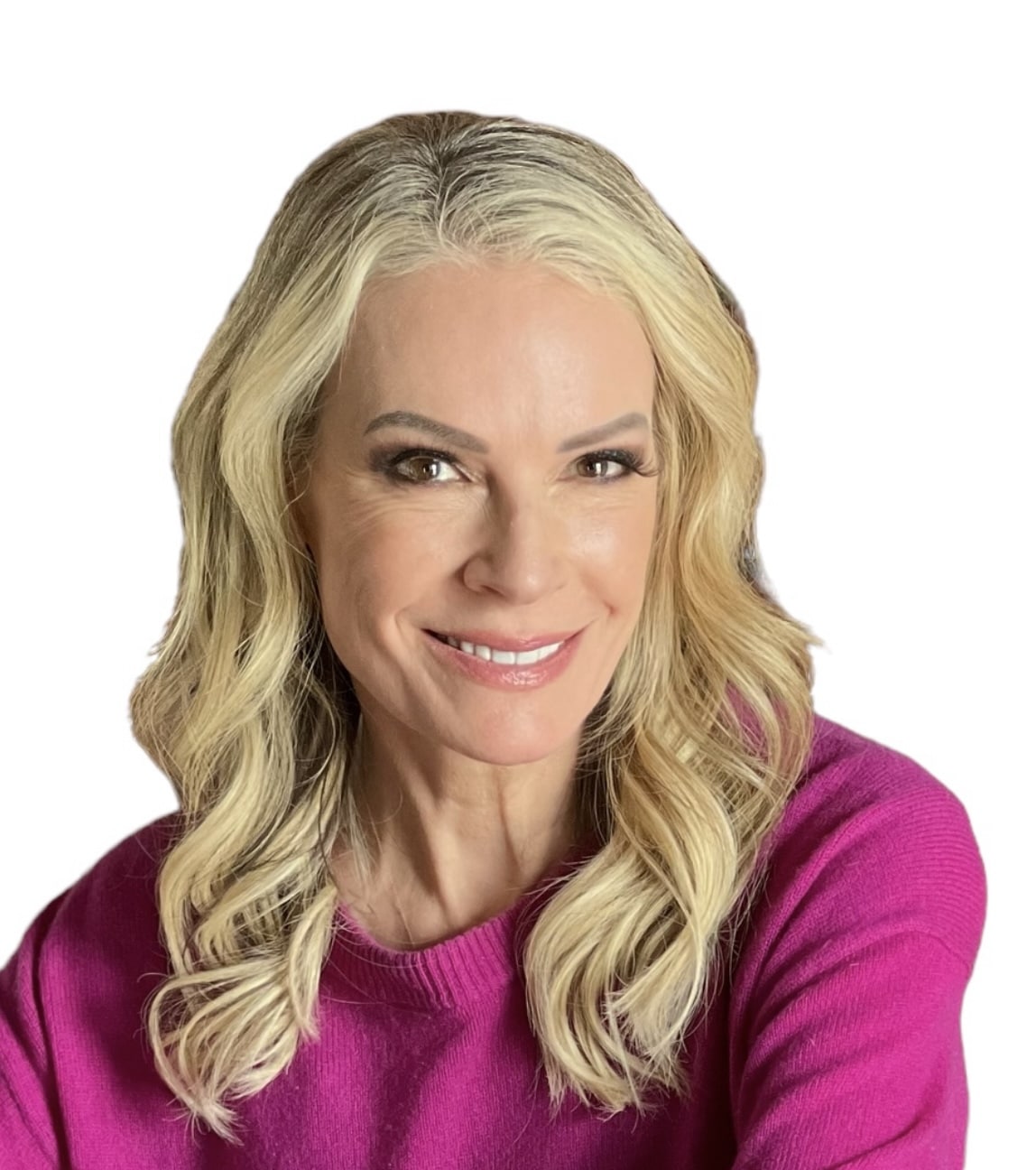
Dr. Nina Savelle-Rocklin is a psychoanalyst, author and radio host specializing in binge eating disorder. She is the author of The Binge Cure: 7 Steps to Outsmart Emotional Eating and Food for Thought: Perspectives on Eating Disorders, and co-editor of Beyond the Primal Addiction. She hosts The Dr. Nina Show radio program on LA Talk Radio.
More episodes

